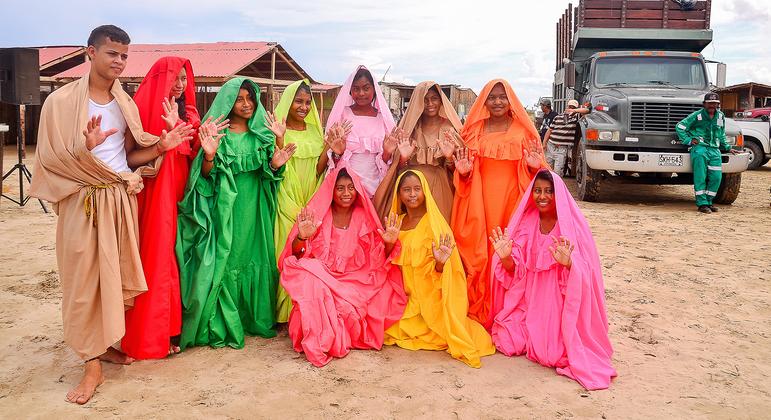
From the economic repercussions of the COVID pandemic to food insecurity exacerbated by the Ukraine war, Secretary-General António Guterres painted a picture of accumulating crises that have put the drive towards the global goals into reverse.
“We must rise higher to rescue the SDGs – and stay true to our promise of a world of peace, dignity and prosperity on a healthy planet,” he underscored at the UN Economic and Social Council (ECOSOC) meeting on Operational Activities for Development.
‘Emergency of global proportions’
The COVID-19 pandemic has led to the loss of some 15 million lives, pushed 100 million into poverty in 2020 alone, and set back human development – especially women’s rights – by a full generation, according to Mr. Guterres.
“The pandemic demanded a united response based on solidarity between developed and developing countries – but that did not happen,” he said.
While developed countries invested trillions in their recovery, the developing world has been left to fend for itself “in a global financial system that favours the richest and punishes the poorest”.
“Many developing countries are now dealing with the health and socio-economic impact of the pandemic; the unequal recovery; the effects of the climate crisis; and the economic shock to food, fuel and financial markets caused by the war in Ukraine,” continued Mr. Guterres, describing the situation as “a development emergency of global proportions”.
‘No time for complacency’
Calling the 2030 Agenda “our clearest pathway forward,” Mr. Guterres said the UN development system had been transformed in recent months to better respond to countries’ needs and priorities.
“But this is no time for complacency. The world is on fire and so far, international cooperation has not delivered for those who need it most,” he said. “We have no alternative but to keep pushing our limits and stepping up our efforts”.
Aligning for development
The Our Common Agenda report includes “a New Global Deal to ensure power, wealth and opportunities are shared more broadly, so countries can invest in their people,” he said.
And it calls for all forms of public and private finance to be aligned with the SDGs and the Paris Agreement.
Within UN Country Teams worldwide, Mr. Guterres identified five areas for urgent attention, beginning with ensuring the skills and expertise needed are there, to support national transitions.
Secondly, UN Resident Coordinators must be supported to help governments expand and improve partnerships, know how, financing, and development solutions.
Next, he underscored the need for collaboration where humanitarian, development and security challenges interact.
“It is not about blurring mandates or resources; it is about ensuring that our assets are deployed coherently to support countries on their sustainable development priorities,” stressed the UN chief.
Business operations need to improve “to make every dollar count”, and finally, regional collaboration must be strengthened to support Resident Coordinators and country teams – all of which requires “adequate, predictable and sustainable funding”.
As the world’s multiple crises raise the bar ever higher, the UN chief assured that the UN was ready to scale up to meet expectations.

UNDP India
Women in India are being encouraged to play a leading role in sustainable development especially on gender equality issues.
Addressing challenges multilaterally
Joining virtually from Gaborone, Botswana, ECOSOC President Collen Kelapile observed that the pandemic – coupled with other pre-existing challenges such as the climate crisis, protracted conflicts and now the Ukraine war – “are generating all-time high humanitarian needs and setting back decades of development progress”.
He said that the international community must work together to “accelerate action to achieve a transformative post-COVID-19 recovery, as well as redouble our efforts to deliver the SDGs for a better future for all”.
“Multilateralism, international cooperation and global solidarity are the only effective ways of dealing with current and emerging global challenges,” he added.
Financing core
The ECOSOC President shared his concern over the long-lasting impacts of scaling down core development resources for reallocation to immediate humanitarian needs, particularly on sustaining the decades-long development achievements.
Moreover, a critical funding gap for UN development agencies must be addressed along with the imbalance between core and non-core resources.
“We must, therefore, acknowledge the high-level of importance the programme countries accord to the core development mandate of the UN Development Agencies and work to effectively support these countries towards achieving the SDGs during the remainder of the Decade of Action,” he said.
Calling for help
General Assembly President Abdulla Shahid, spoke of the quadrennial comprehensive policy review of UN system operational activities during the pandemic in late 2020.
For the first time, it explicitly calls for the UN development system to support social protection, universal health coverage, and education along with assisting the most vulnerable and reinforcing rights-based approaches and gender equality.
“The General Assembly also called for supporting countries in the mobilization of resources and partnerships” and ensuring the sustainability of its operations, said Mr. Shahid.
Seeing the journey through
Deputy Secretary-General Amina J. Mohammed lauded the many returns on investments in development coordination, namely “independent, authoritative leadership; strengthened convening and better coordination; and improved operational efficiency for more ambitious results”.
However, amidst a continued funding shortfall, the ultimate objective of advancing the 2030 Agenda is at risk.
“Reversing this trend, and closing the funding gap, must remain an absolute priority,” she said.
“We must continue the journey together over these next eight years, in earnest, with a sense of urgency, and at the scale needed to keep the promise of the 2030 Agenda and the SDGs,” concluded the Deputy UN chief.

